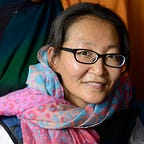Keo’s story: Good nutrition can save lives
Nestled around 1,000 metres above sea level, the Bolaven plateau is a special place in Southern Laos. Vast mountains and waterfalls, a vibrant mix of ethnicities and a cool climate are factors captivating tourists and locals alike. Plants that would not grow in other parts of the country thrive here, such as coffee, a cash crop of the region. The area attracts agricultural investors, and many local people make a living either directly off the land, or exporting produce to neighboring countries, including Thailand.
Keomany Keophansa and her husband Kilay are amongst them. Their two daughters, Tee and Bee, are five and three years old. While their parents are busy travelling to sell coffee beans to a buyer in Paksong and vegetables across the border to Thailand, they stay with their grandmother.
She is old and has difficulty walking, and whenever Keo and Kilay leave their daughters with her, they drop off a heap of sugary drinks and processed snack foods, so that the girls don’t cry when they are in her care. The parents have never thought twice about giving their girls packaged snack foods.
Unhealthy snack foods are cheap and widely available, even in the smallest of villages in Lao PDR. Mothers, especially in rural areas, rarely understand the link between good nutrition choices, health and a bright future.
However, the evidence is clear. What children eat in the first years of their lives is crucial to their physical and cognitive development. Children who are exclusively breastfed until six months of age, followed by a varied diet including fresh fruit and vegetables, meat and fish, grains, as well as calcium rich foods such as dairy, small fish and insects, will help them grow up strong and healthy, learn better, develop better dietary habits, and have the potential to become more successful in their lives.
Together with the Government of Laos, the World Food Programme (WFP) works to raise awareness of healthy eating to mothers and supports the availability of nutritious foods. In WFP-supported village nutrition learning centres, women with young families learn about local varieties of nutritious foods that are easy to plant, harvest and cook into delicious meals.
In a country where child malnutrition is alarmingly high, working against the causes of malnutrition, on scale, is worth gold.
For example, WFP is scouting ways to start the local production of fortified staple foods, such as rice. Fortified rice is enriched with important vitamins and minerals. It has a high potential to fill nutritional gaps and helps diminish health problems such as iron deficiency anemia — a lack of red blood cells — an ailment 44% of children under 5 in Laos suffer from. Fortified rice is distributed to students in WFP-supported schools, where children receive daily hot and nutritious lunches. In the future, WFP hopes to make fortified rice available widely in the Lao food market.
Keo has experienced what is feels like to fear for her children’s health. About a year ago, Bee became very sick. It started with loss of appetite, fatigue and irritability. After becoming weaker and weaker, one day Bee did not want to play outside with her friends. When her parents took her to the hospital, she was diagnosed with malnutrition.
Through the diagnosis and subsequent discussions with the doctor, Keo found out about the link between nutrition and health. Specialised nutritious food supplements helped Bee over the first difficult days, while Keo and Kilay were busy gathering more information on what to feed their daughter to become and stay healthy.
Lots of fresh vegetables directly from the farm, without harmful chemicals, home-cooked rice and animal foods — Keo has learned to buy and cook the right type of food to feed her daughters. She refrains from buying processed snack foods now.
While Bee happily plays with her sister, strong and healthy, Keo knows now how much of an impact her and Kilay’s actions will make on the lives of their daughters. “My girls are learning how to eat well, developing good habits for a lifetime. If they can relearn, so should we adults: Money is not everything. We have nothing if we sacrifice our health and that of our children to earn an income. Ensuring they have healthy food to eat benefits not only our family, but the future of our beautiful country.”
